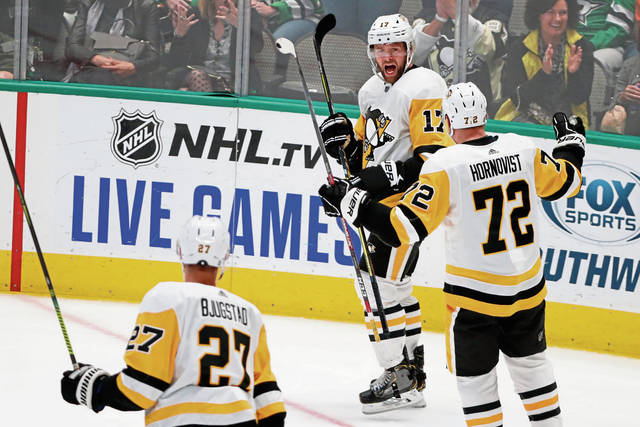https://triblive.com/sports/how-do-injured-penguins-and-other-nhlers-pass-their-free-time/
How do injured Penguins and other NHLers pass their free time?

DALLAS — The Pittsburgh Penguins’ second goal in their 3-0 victory against the Dallas Stars at American Airlines Center came about through technique and hard work.
After an icing call against the Stars, the Penguins were permitted to select which offensive-zone circle they wanted for the ensuing faceoff. Opting for the right dot, they sent out forward Nick Bjugstad, the team’s only full-time right-handed center, to take the draw. He beat Dallas forward Justin Dowling and got the puck to right winger Patric Hornqvist, who then fed a pass to defenseman John Marino. The rookie chopped a slapper, which struck Dowling and deflected into the end boards.
Forward Bryan Rust claimed the puck, worked it to the left of the cage and shuffled it to the crease, where it bounced off the right skate of defenseman John Klingberg and into the cage.
Precision and persistence.
And patience.
The Penguins waited weeks for two components of that sequence — Bjugstad and Rust — to return from injury. Rust missed the first 11 games of the regular season because of a hand injury, and Bjugstad was sidelined for nine games with an undisclosed ailment.
But a team’s waiting might pale in comparison to the biding done by the player healing from injury.
NHL players recovering from long-term maladies often exist in a sort of purgatory while they convalesce. They often don’t travel with the team on road trips. Rarely do they take in practice. Their time with the medical staff usually is much earlier in the day than when their healthy teammates meet up with an athletic trainer or a strength and conditioning coach. If they skate, it usually is well before the rest of the team.
They remain part of the team. Just not with “the boys.”
“When you’re out, it’s tough, especially when the guys are on the road,” said Justin Schultz, who missed about four months last season because of a left ankle injury. “You don’t see anyone really.”
“You’re coming in at different times,” said former Penguins defenseman Erik Gudbranson, traded to the Anaheim Ducks on Friday. “You’re not really seeing the boys. You’re doing stuff on your own. But it’s part of it. It’s just kind of how it is. You’re part of the team the whole way through … but you can feel a little bit alienated. It’s obviously not coming from the group. It’s not because they don’t want you. It’s just circumstantial.”
The greatest point of alienation might be on road trips. The Penguins just completed a three-game jaunt through Florida and Texas over the span of six days. With Alex Galchenyuk on the verge of returning from an undisclosed injury that has kept him sidelined since Oct. 8, management felt it was important to fly him to Dallas in order to feel a part of the team.
“When you’re at home at practice, you see the guys in the mornings, you see them in the gym, you see them on the ice,” said Gudbranson, who was sidelined for long stretches during his career with shoulder and wrist injuries. “But when they’re gone, it’s pretty much you and whoever else is there. The long ones can get tough.”
Another ex-Penguins defenseman, Jamie Oleksiak, now of the Stars said: “You won’t see the guys for 10 days or something. It’s kind of a weird feeling overall. On the other side of things, you just go on. It’s part of the business.”
In some cases, part of that business simply entails allowing your able-bodied teammates to perform the task at hand.
“You don’t want to be in their way,” said Kris Letang, who has dealt with serious ailments ranging from a stroke to neck surgery. “Guys are focusing. I don’t think (injured) guys are bringing the same amount of focus into a practice or a game. You don’t want to become a distraction for the guys if you’re on the road. It’s just natural to stay at home and actually focus on what you have to do to get better and get healthier.”
An overabundance of free time is another corollary presented by injuries.
“That’s the tough part,” Klingberg said. “With my hand injury last year, it was only 18 games. But the boys were on the road the whole time. So I was (expletive) bored. Video games, (TV) series. You put in extra work around the rink, and you do stuff that you maybe don’t have time to do. You just got to try to occupy yourself.”
“Just got a second dog,” Rust said. “That’s been a handful trying to get the pup acclimated. But just kind of do anything. My wife and I … we’re big foodies. We like to go try new restaurants and stuff.”
For players of a certain age, there are involuntary methods to pass the time away.
“I have kids,” said Letang, 32. “So I’m busy.”
Note: The Penguins had a scheduled off day Sunday.
Follow the Penguins all season long.
Copyright ©2026— Trib Total Media, LLC (TribLIVE.com)
